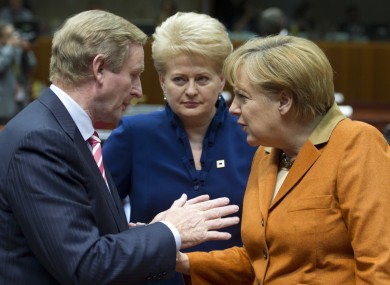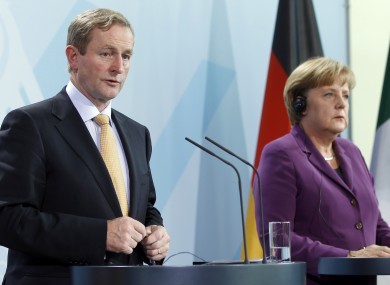THE SALARY for a member of Dáil Éireann is €92,672 and that for a
Senator €65,621. It’s not bad money in the current climate, but the
focus of public resentment in recent days is the expenses and allowances
that go with the jobs, especially at a time when other public-sector
allowances are under scrutiny.
A Dublin-based TD could have a
package worth almost €200,000, including unvouched expenses and two
secretaries or parliamentary assistants at a combined salary of €70,000,
in the first year after election. With vouched expenses he or she could
be pulling in about €210,000. If the TD lived in a far-flung district
of Co Kerry, extra travel expenses would bring the figure to about
€235,000 – and if the deputy were an Independent there would be €41,152
on top of that, making a total of about €276,000 before tax.
This
week the clerk of the Dáil, Kieran Coughlan, suggested that Oireachtas
allowances, which are currently subject to policy decisions by Minister
for Public Expenditure and Reform Brendan Howlin, should be overseen by
an independent body.
Coughlan told the Committee of Public
Accounts that the total spending on members’ expenses this year will be
about €11.7 million, or 11 per cent of the parliamentary budget – and
that this figure, combined with just under €20 million on salaries,
“represents a tiny fraction – one-thousandth – of total State
expenditure for 2012”.
All 166 members of the Dáil and 60 Senators
are eligible to receive a public representation allowance, but
Ministers, who get tax relief on a second home if they live outside
Dublin, do not receive the travel and accommodation allowance.
The
travel allowance is paid to members in bands based on the distance to
Leinster House from their “normal place of residence”. It covers the
cost of travel to and from parliament, overnight stays and, for TDs,
other travel expenses. Senators are paid a lower amount, with no
allowances for constituency travel.
Questions were raised recently
when Joe Higgins, the Socialist Party TD, was allowed expenses for
travelling around the State to promote the anti-household-charge
campaign. Attorney General Máire Whelan SC told Howlin this was a
legitimate claim, but the clerk of the Dáil told the Committee of Public
Accounts this week that the allowance “was always to apply to a Deputy
going to and from Leinster House and around his or her constituency”.
If
they live less than 25km from the Oireachtas, TDs are allowed €12,000
and Senators €7,000. There are 12 bands, paying different rates, the
maximum being for distances of 360km or more – in those cases TDs can
claim €37,850 and Senators €32,850.
The public representation
allowance is payable to all members (including Ministers and Oireachtas
office-holders). Members can opt for either the certified unvouched
amount or the fully vouched amount. Members opting for the vouched
amount must retain receipts for the full sum claimed and may be audited.
Currently, TDs can claim€15,000 unvouched or €25,700 vouched; Ministers
and Ministers of State can claim €12,000 unvouched or €20,000 vouched;
and Senators can claim €9,250 unvouched or €15,000 vouched.
The
Fine Gael TD Eoghan Murphy probably echoed public sentiment when he told
the Committee of Public Accounts this week: “If there is an expense for
a TD or Senator that is not vouched, then it should be vouched.”
All
backbench TDs are entitled to a full-time secretary. (Ministers and
office-holders have separate arrangements.) Senators are entitled to a
half-time secretary.
There is an additional vouched allowance of
€41,092 for secretarial assistance that TDs can use to employ an extra
person full time or divide among individuals for a range of services,
such as PR, secretarial or computer work.
Alternatively, a TD can
claim an annual allowance of €8,888.17 unvouched or €11,591 vouched.
Senators have similar options but at reduced rates.
Less well
known are the additional allowances paid for other positions within the
Houses of the Oireachtas. As of March last year, for example, being the
Fianna Fáil whip brought an extra €19,000; the same post paid €6,000 in
People Before Profit, Sinn Féin and the Socialist Party.
Assistant
whips also get extra allowances. In the Government the sum is €15,000;
in Fianna Fáil €9,500; in Fine Gael €7,500; in the Labour Party €6,000;
and in Sinn Féin €3,000.
In the Seanad, as of May this year, the
deputy leader of the house received an additional €9,500; the Government
whip €6,000; the assistant Government whip €4,000; the Fianna Fáil
leader €9,500; the leader of the Independent Group of Nominee Senators
€6,000; the leader of the Independent Group of University Senators
€6,000; the Fianna Fáil Whip €6,000; the Independent Group of Nominee
Senators’ whip €4,000; and the Independent Group of University Senators’
whip €4,000.
Read more here
http://www.irishtimes.com/newspaper/weekend/2012/1027/1224325772087.html







.png)
.png)
.png)










